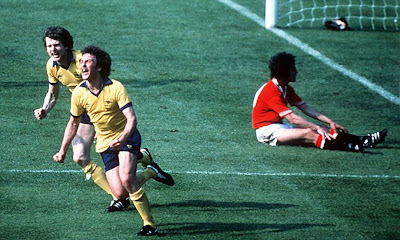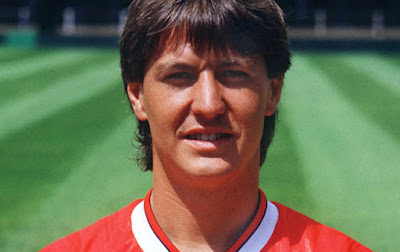Classic Arsenal Players Profile - Part 4 - Alan Sunderland
SUNDY THE LAST MINUTE MAN
NOT MANY PLAYERS have their name indelibly linked with one match in quite the way Alan Sunderland does. Michael Thomas, surging through the midfield, Sergio Agueroooo, and Ole Gunnar Solsjaer perhaps do, but Sunderland's moment pre-dates them all.
With just seconds left of the 1979 FA Cup final, Manchester United had just scored twice to pull off an improbable comeback from 2-0 down. The cup looked to be slipping away from Arsenal for the second year in a row.
The crowd and the watching millions on TV around the world were just regaining their breath awaiting extra time when Liam Brady, the day's outstanding player, fed Graham Rix down the left. When his cross was misjudged by United goalkeeper, Gary Bailey, Sunderland arrived at the far post to slide the ball into the empty net and, in part due to his screaming celebration as much as the goal itself, created his own mark in English football history.
Alan Sunderland was born on 1 July 1953 in Conisbrough, Yorkshire and joined Wolverhampton Wanderers as an apprentice in 1969. A hard working midfield player back then, Sunderland signed as a professional at Molinuex two years later.
During his eight years at Wolves, Sunderland won the League Cup in 1974, playing in the final victory over Manchester City, and later helped the club win promotion to Division One in 1977.
However it was in November of that year that he left the Midlands club to sign for Terry Neill's Arsenal for £220,000, making his debut in a 2-1 win at Old Trafford later that same week. He had made just short of 200 appearances for Wanderers, scoring 30 goals.
At first he remained in midfield, supporting the front two of Malcolm MacDonald and Frank Stapleton, as he helped his new club reach the 1978 FA Cup final, scoring three goals along the way, including one against his former club in the Fourth Round.
Arsenal were beaten 1-0 in the final by Ipswich Town but they would return the following season with Sunderland now playing as a striker.
The switch was forced early in the 1978/79 season following a serious injury to MacDonald which ruled him out for the rest of the season and would ultimately end his playing career.
Sunderland at first struggled for goals in the central role, scoring just four times in the opening 25 matches of the season, although he was building a very good understanding with Stapleton.
But curly haired Yorkshire man really announced himself as a striker just before Christmas when he scored a hat-trick in a 5-0 win away at Tottenham Hotspurs, a great way to endear yourself to the North Bank fans, and after that he could not stop scoring.
Among his 16 goals that season were three more on the way to a second consecutive FA Cup final, where Arsenal would face Manchester United and his date with destiny.
The following 1979/80 season, Sunderland finished as top scorer with 29 goals. Again he found the FA Cup a good competition as he scored four times on route at another final, although he only picked up a runners up medal this time as West Ham United won 1-0.
Four days later Sunderland tasted defeat again as Arsenal lost on penalties to Valencia in the final of the European Cup Winners Cup, although Sunderland did score his penalty in the shoot-out, along with Stapleton, Brian Talbot and John Hollins.
Following a disappointing 1980/81 season where Sunderland scored just nine times, he took on more responsibility when Stapelton left for Manchester United in the summer of 1981.
He was top scorer again in 1981/82 with 12 goals, and scored 12 more in 1982/83 in partnership with new signing Tony Woodock.
The arrival of Charlie Nicholas in the summer of 1983, having scored nearly 50 goals for Celtic the previous season, was the beginning of the end for the 30 year old Sunderland, and he left to join Ipswich Town, as part of the deal that brought Paul Mariner to Highbury, in February 1984.
In the end Sunderland scored 92 goals in 281 appearances for the Gunners but will always be remembered for just one.
Sunderland remained at Ipswich for two years, scoring eight times in 43 appearances, before ending his playing career at Derry City in Ireland, where he scored twice in four matches in 1987.
After retiring from playing, Sunderland bought a pub in Ipswich, which became a popular venue for travelling Arsenal fans whenever they visited the town, but he was forced to sell up after by his own admission, he began drinking too much.
In 1995 he moved to Malta where he did some coaching for Burkirkara FC while becoming an active member of the Malta Wolves, a supporters club for the Molineux side, where he still attends regular fans meetings.
Although he was past his Arsenal peak when I first started watching him play in the early 1980s, Sundy was always a player I admired. He was a hard working striker and hard as nails, and seemed to have the lovely knack of popping up with important goals in the big games.
He also loved a goal away at Tottenham and for that alone he deserves to be remembered fondly, although it is that goal and celebration at Wembley that will be the lasting image of an instantly recognizable figure.
Coming up next time I look back a memorable match from the otherwise disappointing 1983/84 season; a 3-2 Derby Day success against the Old Enemy. Now that's one you will not want to miss.
NOT MANY PLAYERS have their name indelibly linked with one match in quite the way Alan Sunderland does. Michael Thomas, surging through the midfield, Sergio Agueroooo, and Ole Gunnar Solsjaer perhaps do, but Sunderland's moment pre-dates them all.
With just seconds left of the 1979 FA Cup final, Manchester United had just scored twice to pull off an improbable comeback from 2-0 down. The cup looked to be slipping away from Arsenal for the second year in a row.
The crowd and the watching millions on TV around the world were just regaining their breath awaiting extra time when Liam Brady, the day's outstanding player, fed Graham Rix down the left. When his cross was misjudged by United goalkeeper, Gary Bailey, Sunderland arrived at the far post to slide the ball into the empty net and, in part due to his screaming celebration as much as the goal itself, created his own mark in English football history.
Alan Sunderland was born on 1 July 1953 in Conisbrough, Yorkshire and joined Wolverhampton Wanderers as an apprentice in 1969. A hard working midfield player back then, Sunderland signed as a professional at Molinuex two years later.
During his eight years at Wolves, Sunderland won the League Cup in 1974, playing in the final victory over Manchester City, and later helped the club win promotion to Division One in 1977.
However it was in November of that year that he left the Midlands club to sign for Terry Neill's Arsenal for £220,000, making his debut in a 2-1 win at Old Trafford later that same week. He had made just short of 200 appearances for Wanderers, scoring 30 goals.
At first he remained in midfield, supporting the front two of Malcolm MacDonald and Frank Stapleton, as he helped his new club reach the 1978 FA Cup final, scoring three goals along the way, including one against his former club in the Fourth Round.
Arsenal were beaten 1-0 in the final by Ipswich Town but they would return the following season with Sunderland now playing as a striker.
The switch was forced early in the 1978/79 season following a serious injury to MacDonald which ruled him out for the rest of the season and would ultimately end his playing career.
Sunderland at first struggled for goals in the central role, scoring just four times in the opening 25 matches of the season, although he was building a very good understanding with Stapleton.
But curly haired Yorkshire man really announced himself as a striker just before Christmas when he scored a hat-trick in a 5-0 win away at Tottenham Hotspurs, a great way to endear yourself to the North Bank fans, and after that he could not stop scoring.
Among his 16 goals that season were three more on the way to a second consecutive FA Cup final, where Arsenal would face Manchester United and his date with destiny.
The following 1979/80 season, Sunderland finished as top scorer with 29 goals. Again he found the FA Cup a good competition as he scored four times on route at another final, although he only picked up a runners up medal this time as West Ham United won 1-0.
Four days later Sunderland tasted defeat again as Arsenal lost on penalties to Valencia in the final of the European Cup Winners Cup, although Sunderland did score his penalty in the shoot-out, along with Stapleton, Brian Talbot and John Hollins.
Following a disappointing 1980/81 season where Sunderland scored just nine times, he took on more responsibility when Stapelton left for Manchester United in the summer of 1981.
He was top scorer again in 1981/82 with 12 goals, and scored 12 more in 1982/83 in partnership with new signing Tony Woodock.
The arrival of Charlie Nicholas in the summer of 1983, having scored nearly 50 goals for Celtic the previous season, was the beginning of the end for the 30 year old Sunderland, and he left to join Ipswich Town, as part of the deal that brought Paul Mariner to Highbury, in February 1984.
In the end Sunderland scored 92 goals in 281 appearances for the Gunners but will always be remembered for just one.
Sunderland remained at Ipswich for two years, scoring eight times in 43 appearances, before ending his playing career at Derry City in Ireland, where he scored twice in four matches in 1987.
After retiring from playing, Sunderland bought a pub in Ipswich, which became a popular venue for travelling Arsenal fans whenever they visited the town, but he was forced to sell up after by his own admission, he began drinking too much.
In 1995 he moved to Malta where he did some coaching for Burkirkara FC while becoming an active member of the Malta Wolves, a supporters club for the Molineux side, where he still attends regular fans meetings.
Although he was past his Arsenal peak when I first started watching him play in the early 1980s, Sundy was always a player I admired. He was a hard working striker and hard as nails, and seemed to have the lovely knack of popping up with important goals in the big games.
He also loved a goal away at Tottenham and for that alone he deserves to be remembered fondly, although it is that goal and celebration at Wembley that will be the lasting image of an instantly recognizable figure.
Coming up next time I look back a memorable match from the otherwise disappointing 1983/84 season; a 3-2 Derby Day success against the Old Enemy. Now that's one you will not want to miss.







Comments
Post a Comment